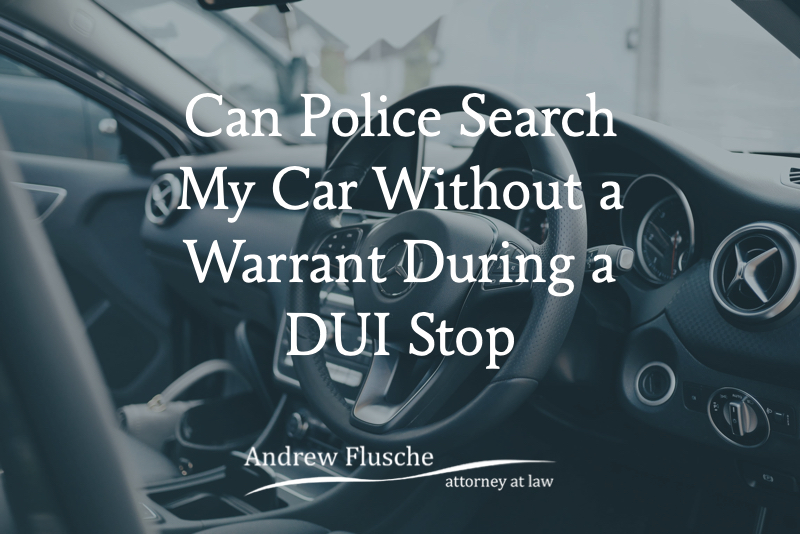
If you’re wondering, when can police search your car during a DUI stop without a warrant, we’re here to answer your questions! The Fourth Amendment to the U.S. Constitution protects citizens from unreasonable searches and seizures by law enforcement.
This protection prohibits law enforcement from searching places where the individual has a “legitimate expectation of privacy.”
To legally perform a search and seizure, authorities typically need a warrant for the search based on probable cause.
In some cases, a court will exclude evidence obtained through a violation of the Fourth Amendment.
Several exceptions apply to the Fourth Amendment’s prohibition against unreasonable searches and seizures.
Many criminal defendants find these exceptions unfair and confusing.
An experienced DUI defense attorney can help explain what these exceptions are and what they mean.
If authorities stop you for DUI and violate your rights during a resultant police vehicle search, contact an attorney right away.
An experienced DUI attorney can guide you through the criminal process and help prepare your legal defense.
When Can Police Search Your Car?
Many clients want to know when police can search your car without a warrant.
There are several ways authorities can legally perform a police vehicle search without a warrant.
The following situations demonstrate these exceptions to the Fourth Amendment.
1. Search by Consent
Police can conduct a legal search of your vehicle by obtaining your consent to do so.
Even if the police don’t suspect you of drunk driving, they might still ask for permission to search your vehicle.
In many cases, people give law enforcement consent to search because they do not realize they have a choice.
Getting pulled over is a stressful experience and causes many drivers to react in the heat of the moment.
However, it’s crucial to remember that you can refuse an officer’s request to search your vehicle.
Sadly, the police won’t advise you of your right to refuse them when they ask for consent to search. That’s why you need to understand your rights before the situation occurs.
If the police conduct a search without permission, try not to panic. Arguing with the officers or trying to obstruct their search, however illegal, could land you in more trouble.
The court will likely exclude any illegally obtained evidence anyway, so do not add to your troubles by struggling with the officers.
2. Search Incident to Lawful Arrest
Unfortunately, officers can conduct a vehicle search without consent or a warrant in some situations.
For example, law enforcement can search an individual after performing a lawful arrest.
Thus, if an officer arrests you for driving under the influence (DUI), the officer can search the areas in your vehicle that were accessible to you in the driver’s seat.
Typically, this means the entire interior of a vehicle. But it does not include detached spaces such as the trunk of your car.
This justification for a warrantless search aims to keep law enforcement officers safe in the event the arrestee has a weapon handy.
3. Plain View Doctrine
A third way to justify a warrantless vehicle search by police involves the plain view doctrine.
Under this doctrine, officers can seize items in plain view if they have reason to believe the item is contraband.
Simply put, if an officer sees contraband while standing in an area where they are allowed to be, the officer can seize the item.
For example, if an officer pulls you over for speeding and sees an open alcoholic container in the cupholder, the officer does not need a search warrant to seize the container and charge you with the appropriate violation.
4. Probable Cause
A common way law enforcement justifies vehicle searches without a warrant is by demonstrating probable cause.
Probable cause exists when an officer sees or smells something, or otherwise has cause to believe that you committed or are committing a crime.
In the case of a DUI, the smell of alcohol on your breath combined with bloodshot eyes and slurred speech can help establish probable cause that you are driving under the influence.
This can give them probable cause to arrest you and to subsequently search your car.
Even if an officer simply sees an open alcoholic beverage in your cup holder, that can give them probable cause to search your car because it indicates you have committed a crime.
5. Inventory Search
In some cases, law enforcement will impound your vehicle when you are arrested for DUI.
When a vehicle is impounded, officers can conduct a police vehicle search to inventory its contents.
Officers perform inventory searches to ensure all of your property gets returned to you.
Additionally, inventory searches help police departments avoid allegations that officers are stealing an arrestee’s property.
However, officers occasionally locate additional contraband and evidence of criminal activity during an inventory search.
Our Attorneys Can Help You Challenge an Unreasonable Police Vehicle Search
When your freedom is at stake, consulting with an attorney who understands the exceptions to the Fourth Amendment is critical.
Otherwise, you could leave your future in the hands of someone that is not qualified to represent you.
I have represented many clients throughout Virginia who faced various levels of DUI charges.
You need an ally and advocate to help you understand the potential defenses available in your criminal case and whether they apply to you.
My results-oriented approach to cases focuses on getting your charges reduced, or your case dismissed whenever possible.
I routinely file motions and argue to protect my clients’ constitutional rights— including arguing for the exclusion of any illegally-obtained evidence.
So don’t hesitate. Contact our office today to set up your initial consultation.

